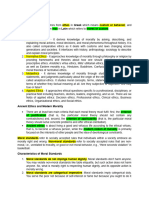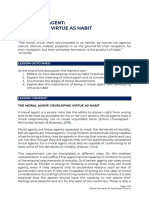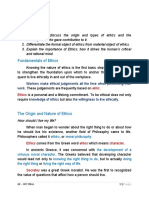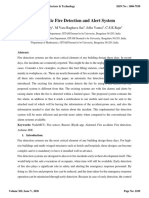Crim 4 Lesson 1
Crim 4 Lesson 1
Uploaded by
Rhogie Ruego OndeCopyright:
Available Formats
Crim 4 Lesson 1
Crim 4 Lesson 1
Uploaded by
Rhogie Ruego OndeOriginal Title
Copyright
Available Formats
Share this document
Did you find this document useful?
Is this content inappropriate?
Copyright:
Available Formats
Crim 4 Lesson 1
Crim 4 Lesson 1
Uploaded by
Rhogie Ruego OndeCopyright:
Available Formats
CRIM 4
LESSON 1
ETHICS AND VALUES
DEFINITION OF ETHICS
As a field of study, ethics is a branch of philosophy which studies the principles of wring and wrong in
human conduct.
Ethics outlines theories of right or wrong, morality translate these theories into action. Therefore,
morality is nothing else but it is a doing of ethics.
Morality is principles concerning the distinction between right and wrong or good and bad
behavior. Morality is the quality of human acts by which they are constituted as good, bad, or
indifferent.
Moral Distinctions
“Dictates of Reasons” stands for the norm of morality which is the standard by which
actions are judge as to their merits or demerits.
Classification of Actions according to the Norms of Morality
1. Moral (Good) actions are those actions which are in conformity with the norm of morality.
2. Immoral (Bad) actions are those actions which are not in conformity with the norm of
morality.
3. Amoral (Indifferent) actions are those actions which stand neutral in relation to the norm of
morality. They are neither good nor bad in themselves. But certain amoral actions may
become good or bad because of the circumstances attendant to them.
MORAL VALUES
are those that directly pertain to the function of intellect and will; those choices, decisions,
and actions, by which man’s national faculties are involved and perfected.
Virtue
It means moral excellence. A virtue is a trait or quality that is deemed to be morally good and
thus is valued as a foundation of principle and good moral being.
FOUR MORAL VIRTUES
1. PRUDENCE – the ability to govern and discipline oneself by the use of reason.
2. JUSTICE – is the morally fair and right state of everything.
3. FORTITUDE/COURAGE – strength of mind that enables a person to encounter danger or bear
pain or adversity with courage.
4. TEMPERANCE/MODERATION – moderation in action, thought, or feelings; restraint.” It is the
habit of moderation in the use of pleasurable things.
HIERARCHY OF VALUES
It refers to the order of value from the lowest to the highest in importance.
Guides in our preference to choose values.
1. Permanent or lasting values must be preferred over temporary values
Example: education over courtship
2. Values favored by greater number of people must be preferred over those that appeal only
to the few.
Example: discipline over personal freedom
3. Values that are essential must be preferred over those that are accidental.
Example: health over beauty
4. Values that give greater satisfaction must be preferred over those that provide short-lived
pleasures.
Example: pursuing your artistic hobby over fanatical devotion to a movie star.
THE HIGHEST VALUE – GOD
The Summum bonum (the highest good) by St. Thomas Aquinas is generally thought of as
being an end in itself, and at the same time containing all other goods.
The highest good is usually defined as the life of the righteous and/or the life led in
communion with God and according to God’s precepts. He (God) is the Summum bonum the
ultimate and absolute good that will fulfill all human desires. God is the ultimate end of human life.
God is not only the Alpha and the Omega of the created universe, he is the preserver of values.
BENEFITS OF KNOWING GOD
1. Eternal life/ Quality of life
2. Proper evaluation of Humanity
3. Knowing God reveals our sin
4. Knowing God helps us give value to Humanity
5. Proper evaluation of Morality
6. Not knowing God leas to approval of Sin
7. Peace and Security
8. Increased Wisdom
9. Multiplication of Blessings
10. Multiplied Grace
11. Multiplied Peace
12. Multiplied Power
13. A worthy and pleasing life
14. Fruitfulness
15. Endurance, Patience, Joy, and Thanksgiving
You might also like
- Theories and Principles of Heath EthicsDocument92 pagesTheories and Principles of Heath EthicsPrincess C. SultanNo ratings yet
- Crim 4 Professional Conduct and Ethical StandardDocument34 pagesCrim 4 Professional Conduct and Ethical StandardEmelie Tipay93% (14)
- CRIM4 Module1Document7 pagesCRIM4 Module1Mher Buenaflor100% (1)
- Reading MaterialDocument11 pagesReading MaterialPamela delmundoNo ratings yet
- Reviewer in EthicsDocument8 pagesReviewer in EthicsChris DimaguilaNo ratings yet
- Notes EthicsDocument11 pagesNotes EthicsAaron John R CaoNo ratings yet
- Professional Conduct and Ethical StandardsDocument34 pagesProfessional Conduct and Ethical StandardsErald DebulgadoNo ratings yet
- Midterm in Ethics Rev.Document11 pagesMidterm in Ethics Rev.yeye latayan100% (1)
- Ethics 1 Introduction To EthicsDocument31 pagesEthics 1 Introduction To EthicsCorrine Abucejo100% (3)
- Ethics Prelims DGDocument2 pagesEthics Prelims DGAngela Christine CagaoanNo ratings yet
- Ethics PrelimDocument57 pagesEthics PrelimLenie Alvarez100% (1)
- Criminology 4 Professional Conduct and Ethical StandardsDocument28 pagesCriminology 4 Professional Conduct and Ethical StandardsMarcel CataynaNo ratings yet
- Lesson 3 Morality and FreedomDocument26 pagesLesson 3 Morality and FreedomRon Vincent SamonteNo ratings yet
- Ethics ReviewerDocument8 pagesEthics Reviewerelyssesantiago6No ratings yet
- 2 A Dimensions of EthicsDocument12 pages2 A Dimensions of EthicsAbhishek YadavNo ratings yet
- Ethics Meaning and ScopeDocument49 pagesEthics Meaning and ScopeQueenie Rose BacolodNo ratings yet
- Prof ConductDocument25 pagesProf Conductpascuabonbon615No ratings yet
- Ethics ReviewerDocument12 pagesEthics ReviewerAlyson Barrozo100% (2)
- Gen 006 p1 ReviewerDocument11 pagesGen 006 p1 RevieweritsrizaruizNo ratings yet
- Philosophy, Ethics & MoralityDocument34 pagesPhilosophy, Ethics & MoralityRr NgayaanNo ratings yet
- Unit I - PeeDocument31 pagesUnit I - PeeMurugesan SNo ratings yet
- Ethics Assignment-Virtual EthicsDocument10 pagesEthics Assignment-Virtual EthicsHn YungNo ratings yet
- Review of Midwifery EthicsDocument33 pagesReview of Midwifery EthicsJulia Sta Ana100% (2)
- Crim 4 Module 3Document9 pagesCrim 4 Module 3Jerry PlatinNo ratings yet
- Ethics OutlineDocument5 pagesEthics OutlineOlivia AlmazanNo ratings yet
- ETHICSDocument10 pagesETHICShazelannelucas40No ratings yet
- Local Media1142198515278677062Document16 pagesLocal Media1142198515278677062Cal JariusNo ratings yet
- ET Lesson 4Document12 pagesET Lesson 4jaizJNo ratings yet
- Crim 102Document2 pagesCrim 102carloscaraig18No ratings yet
- GRP4 ss24Document12 pagesGRP4 ss24sanchezdenden465No ratings yet
- Chapter Two Approaches To Ethics: Ayenew Birhanu (PHD)Document43 pagesChapter Two Approaches To Ethics: Ayenew Birhanu (PHD)Nasri IBRAHIMNo ratings yet
- Ethics ReviewerDocument6 pagesEthics ReviewerTohruNo ratings yet
- CRIM 4 - Professional Conduct and Ethical StandardsDocument27 pagesCRIM 4 - Professional Conduct and Ethical StandardsMar YanNo ratings yet
- Introduction To EthicsDocument33 pagesIntroduction To EthicsMay Dee GrefalNo ratings yet
- Chapter 4Document20 pagesChapter 4Alyssa Grace CamposNo ratings yet
- ReviewerDocument7 pagesReviewersherlyncalicdan62No ratings yet
- Module 1 Ethics Chapter 1Document5 pagesModule 1 Ethics Chapter 1joytabao0509No ratings yet
- Professional Conduct P 28 37Document32 pagesProfessional Conduct P 28 37Clares BismonteNo ratings yet
- Ge8 Midterm W 1Document20 pagesGe8 Midterm W 1BLGU KanibongNo ratings yet
- EthicsDocument2 pagesEthicsDulce Marie Gonzaga AgmataNo ratings yet
- EthicsDocument2 pagesEthicsAlysson CincoNo ratings yet
- Pe NotesDocument63 pagesPe NoteskarenNo ratings yet
- EthicsDocument16 pagesEthicsLovely CastilloNo ratings yet
- Chapter-6-and-7-ethicsDocument20 pagesChapter-6-and-7-ethicsAljane Mae TabiosNo ratings yet
- Lesson 4 - The Moral Agent - Developing Virtue As A HabitDocument6 pagesLesson 4 - The Moral Agent - Developing Virtue As A HabitMark Louie Ramirez100% (2)
- Professional EthicsDocument37 pagesProfessional EthicsruthraNo ratings yet
- GHHJJKKDocument38 pagesGHHJJKKMark Anthony LegaspiNo ratings yet
- Crim 6 Prelim TermDocument12 pagesCrim 6 Prelim TermlinggianjolenaNo ratings yet
- Ethics Module 1Document7 pagesEthics Module 1mark.torrechillaNo ratings yet
- The Study of EthicsDocument21 pagesThe Study of EthicsDrunkk BaestarrdNo ratings yet
- Unit 1 - Business EthicsDocument23 pagesUnit 1 - Business Ethics088jay IsamaliyaNo ratings yet
- Gen 006Document3 pagesGen 006zoba.padama.upNo ratings yet
- SOCSCI221 Ethics ReviewerDocument7 pagesSOCSCI221 Ethics Reviewervincent aldeNo ratings yet
- Topic 2 - EthicsDocument17 pagesTopic 2 - EthicsEmmanuelle De MesaNo ratings yet
- Sir-NiñoDocument5 pagesSir-NiñoRaiza NufableNo ratings yet
- Values, Norms, Beliefs, Virtues, Morality, Moral StandardsDocument6 pagesValues, Norms, Beliefs, Virtues, Morality, Moral StandardsPartha J HazarikaNo ratings yet
- Fundamental of EthicsDocument4 pagesFundamental of EthicsEm HernandezNo ratings yet
- Module 1 - GE107Document12 pagesModule 1 - GE107roderikoNo ratings yet
- Elements of Morals: With Special Application of the Moral Law to the Duties of the Individual and of Society and the StateFrom EverandElements of Morals: With Special Application of the Moral Law to the Duties of the Individual and of Society and the StateNo ratings yet
- Decoding Right from Wrong: 7 Key Strategies for Ethical Decision-MakingFrom EverandDecoding Right from Wrong: 7 Key Strategies for Ethical Decision-MakingNo ratings yet
- Nowledge, Attitude, and Practices Related To Cutaneous Leishmaniasis in An Endemic Focus of Cutaneous Leishmaniasis, Outhern RanDocument4 pagesNowledge, Attitude, and Practices Related To Cutaneous Leishmaniasis in An Endemic Focus of Cutaneous Leishmaniasis, Outhern RanDani Yitu MedanituNo ratings yet
- Mam Mascunana ActivityDocument7 pagesMam Mascunana ActivityJHON DAVE BAYON-ONNo ratings yet
- Task 2 Defining ESP 551038 - 1Document10 pagesTask 2 Defining ESP 551038 - 1Celeli AlvarezNo ratings yet
- 618 FullDocument11 pages618 Fulleric22hkNo ratings yet
- Group-1-Pr2-Research 1 02Document46 pagesGroup-1-Pr2-Research 1 02Jhon Keneth NamiasNo ratings yet
- Science 10 - Test QuestionnaireDocument12 pagesScience 10 - Test Questionnaireronald bantuganNo ratings yet
- GMAT Vocabulary ListDocument171 pagesGMAT Vocabulary ListdanialarNo ratings yet
- The Shadow Page GuideDocument41 pagesThe Shadow Page Guideusayd340No ratings yet
- Attachment 58 Sample Sole Source Justifications 1Document3 pagesAttachment 58 Sample Sole Source Justifications 1mkgofeloNo ratings yet
- Relevance of IR in 21st CenturyDocument7 pagesRelevance of IR in 21st Centurybored galNo ratings yet
- Hydrolic Unit Atox MillDocument6 pagesHydrolic Unit Atox MillGoriss100% (1)
- Manual John Deere Bombas Iny.Document550 pagesManual John Deere Bombas Iny.Moises Carrera Angulo88% (25)
- Public Workshop #1 SummaryDocument1 pagePublic Workshop #1 SummaryEllyn SantiagoNo ratings yet
- Why People Should Take Part in Volunteering Work? (150-180w)Document3 pagesWhy People Should Take Part in Volunteering Work? (150-180w)Minh NguyệtNo ratings yet
- Alisha Hagen: Employment HistoryDocument2 pagesAlisha Hagen: Employment Historyapi-248049892No ratings yet
- PollDocument6 pagesPollYogesh DuaNo ratings yet
- Tiago Tigor Infotainment GuideDocument2 pagesTiago Tigor Infotainment Guidejotowekid100% (1)
- ReportDocument55 pagesReporthardik000022No ratings yet
- 1613 - Public Speaking For Success Bryski 5986-0 f14 - ch1Document18 pages1613 - Public Speaking For Success Bryski 5986-0 f14 - ch1Kristine GonzalesNo ratings yet
- Lab. AgregadosDocument37 pagesLab. AgregadosRichard Choque VasquezNo ratings yet
- WEG W22 Three Phase Motor Technical European Market 50025712 Brochure EnglishDocument72 pagesWEG W22 Three Phase Motor Technical European Market 50025712 Brochure EnglishRevi Adikharisma100% (1)
- DTC C1551 IG Power Supply Voltage Malfunction: DescriptionDocument3 pagesDTC C1551 IG Power Supply Voltage Malfunction: DescriptiondiemnganNo ratings yet
- Civic Education Scheme of Work For Junior Secondary School JSS 1Document6 pagesCivic Education Scheme of Work For Junior Secondary School JSS 1Omowunmi Salam100% (1)
- Alfredo Di Stefano Historias de Una Leyenda PDFDocument2 pagesAlfredo Di Stefano Historias de Una Leyenda PDFGeorge A. LoayzaNo ratings yet
- Power EngineeringDocument44 pagesPower EngineeringSai VikramNo ratings yet
- Chaitanya IntroductionDocument7 pagesChaitanya Introductionanon_647217551100% (1)
- Lekhani Chirwa Wins Inaugural Wyllie Longmore AwardDocument1 pageLekhani Chirwa Wins Inaugural Wyllie Longmore AwardAiden CondronNo ratings yet
- Digital Filters - Implementation and Design: Basic Filtering OperationsDocument19 pagesDigital Filters - Implementation and Design: Basic Filtering OperationsPATEL SWAPNEELNo ratings yet
- 217 May2020Document9 pages217 May2020K.R.Pravein RameshNo ratings yet
- LT-3 4Document5 pagesLT-3 4petbensilvaNo ratings yet

























































































